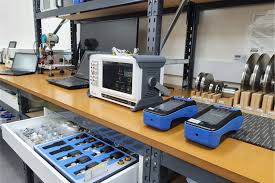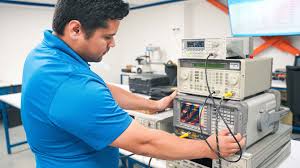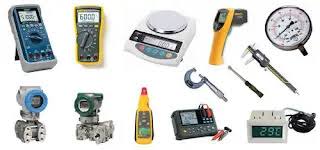Calibration standards in Egypt play a crucial role in ensuring the accuracy and consistency of measurements across various fields, including...
Calibration standards in Egypt play a crucial role in ensuring the accuracy and consistency of measurements across various fields, including scientific research, industrial manufacturing, and environmental monitoring. Establishing and maintaining high-quality calibration standards is essential for guaranteeing the reliability of measurements and the validity of scientific findings. In this paper, we will explore the current state of calibration standards in Egypt and examine the efforts being made to ensure their effectiveness and consistency. By focusing on the specific challenges and initiatives in Egypt, we aim to shed light on the importance of calibration standards in the country and the potential impact of their improvement on various sectors.
Establishing calibration standards in Egypt is crucial for ensuring the accuracy and consistency of measurements across various industries. Calibration standards are used to validate the performance of measurement instruments and ensure that they provide reliable and precise results. In Egypt, the National Institute for Standards (NIS) is responsible for developing and maintaining calibration standards. The NIS works in collaboration with international organizations and follows international best practices to ensure that the calibration standards meet the highest quality requirements. Calibration standards in Egypt are established for a wide range of measurement parameters, including length, mass, temperature, pressure, and electrical quantities. These standards are used by industries such as manufacturing, healthcare, pharmaceuticals, and environmental monitoring to ensure the quality and reliability of their products and services. By adhering to established calibration standards, businesses in Egypt can demonstrate their compliance with regulatory requirements and international quality standards. This not only enhances their credibility in the global market but also helps to improve the overall efficiency and competitiveness of the Egyptian industry. Overall, establishing and maintaining calibration standards in Egypt is essential for promoting accuracy, consistency, and reliability in measurements, which are fundamental for the success of businesses and the well-being of society.
Understanding the Importance of Calibration Standards in Egypt

Calibration standards are crucial in Egypt to ensure accuracy and consistency in measurement instruments. These standards are essential for a wide range of industries including manufacturing, health care, and environmental monitoring. They help to ensure that equipment and instruments are working correctly and producing accurate results. By using calibration standards, businesses and organizations in Egypt can maintain quality control, comply with regulations, and ultimately save time and money by avoiding errors and inaccuracies. Overall, understanding the importance of calibration standards in Egypt is essential for maintaining high standards of quality and performance.
The Role of Calibration Standards in Ensuring Accuracy in Egypt

The role of calibration standards in ensuring accuracy in Egypt is essential for various industries and sectors. Calibration standards are used to ensure that measuring instruments and equipment are accurate and reliable for their intended purposes. In Egypt, calibration standards are particularly important in industries such as oil and gas, manufacturing, pharmaceuticals, and healthcare, where precise measurements are crucial for safety, product quality, and compliance with regulations. By regularly calibrating measuring instruments and equipment against recognized standards, organizations in Egypt can ensure the accuracy of their measurements, reduce the risk of errors and inconsistencies, and improve overall operational efficiency. Calibration standards also play a key role in supporting international trade, as they help to establish trust and confidence in the accuracy of measurements and the quality of products and services. In Egypt, the National Institute of Standards (NIS) is responsible for maintaining and disseminating calibration standards for various measurements, including length, mass, volume, temperature, and pressure. The NIS works to ensure that calibration standards are traceable to international standards and are consistent with the requirements of the International System of Units (SI). Overall, calibration standards are essential for ensuring accuracy and reliability in measurements across diverse industries in Egypt, ultimately contributing to improved product quality, safety, and regulatory compliance.
Calibration Standards: A Vital Component of Measurement in Egypt

Calibration standards play a crucial role in ensuring accurate and reliable measurements in various industries in Egypt. These standards serve as a reference point for instruments and equipment used for measurement, helping to minimize errors and ensure precision in the results obtained. In Egypt, calibration standards are utilized in a wide range of fields including manufacturing, healthcare, energy, and environmental monitoring. Adhering to established calibration standards is essential for meeting regulatory requirements and maintaining quality control in measurement processes. Additionally, calibration standards contribute to the overall advancement and competitiveness of industries in Egypt by promoting accuracy and consistency in measurement practices.
The Impact of Calibration Standards on Industry in Egypt
The impact of calibration standards on the industry in Egypt is significant. Calibration standards ensure that measurement instruments and devices are accurate and reliable, which is essential for industries such as manufacturing, construction, healthcare, and energy. Having proper calibration standards in place can help to increase productivity and efficiency, as well as enhance the quality and safety of products and services. It also helps in complying with regulations and standards, both locally and internationally. In addition, calibration standards contribute to the overall competitiveness of the Egyptian industry by building trust and confidence in the accuracy of measurements and data. This, in turn, can lead to improved market access and export opportunities. Furthermore, investing in calibration standards can also lead to cost savings by reducing the need for rework or recalls due to inaccurate measurements. It also helps in reducing the risk of errors and deviations in processes, minimizing downtime and waste. Overall, the impact of calibration standards on the industry in Egypt is undeniable, and it plays a crucial role in ensuring the reliability, quality, and competitiveness of various sectors.
Improving Quality Control Through Calibration Standards in Egypt
Improving quality control through calibration standards in Egypt is crucial for ensuring the accuracy and reliability of measurements in various industries. Calibration standards help to establish a reference point for measurements, ensuring consistency and comparability of results. In Egypt, efforts to improve quality control through calibration standards involve the development and implementation of national and international standards, as well as the establishment of accredited calibration laboratories. These initiatives aim to enhance the overall quality infrastructure in the country and promote confidence in Egyptian products and services both domestically and internationally. Furthermore, the adoption of internationally recognized calibration standards can facilitate trade and market access for Egyptian products, as they demonstrate compliance with global quality requirements. This, in turn, can contribute to the competitiveness of Egyptian industries and support economic growth. Overall, by investing in and promoting quality control through calibration standards, Egypt can enhance its reputation for producing high-quality goods and services, which is essential for its continued development and success in the global marketplace.
The Significance of Adhering to Calibration Standards in Egypt
Adhering to calibration standards in Egypt is of utmost importance as it ensures the accuracy and reliability of measurement equipment. By following established standards, organizations can maintain consistency in their measurements and ensure that their equipment is operating within acceptable tolerances. This is particularly crucial in industries such as manufacturing, healthcare, and environmental monitoring, where the accuracy of measurements directly impacts product quality, patient safety, and environmental compliance. Moreover, adhering to calibration standards also helps to demonstrate compliance with international quality and safety regulations, which is essential for businesses seeking to compete in the global marketplace. Additionally, adhering to calibration standards can improve operational efficiency and reduce the risk of costly errors and rework. Therefore, it is vital for organizations in Egypt to prioritize calibration adherence to ensure the accuracy and reliability of their measurement equipment.
Challenges and Opportunities in Implementing Calibration Standards in Egypt
Challenges in implementing calibration standards in Egypt include limited awareness and understanding of the importance of calibration, lack of resources and infrastructure for calibration facilities, and a shortage of skilled personnel. Additionally, there may be resistance to change and the adoption of international standards. On the other hand, there are opportunities for improvement, such as increasing investment in calibration infrastructure, providing training and education on calibration standards, and promoting the benefits of calibration for industries in Egypt. Collaboration with international organizations and partners can also help in adopting best practices and standards in calibration. Overall, addressing these challenges and seizing these opportunities can contribute to the development of a robust calibration system in Egypt.
In conclusion, establishing calibration standards in Egypt is crucial for ensuring accuracy and consistency in measurements across various industries. By adopting international best practices and investing in state-of-the-art calibration equipment, Egypt can elevate its reputation as a reliable and quality-driven market. Calibration standards Egypt must be continuously updated and adhered to in order to meet the growing demands of industries and to maintain consistency in measurements. This will not only bolster the confidence of consumers and stakeholders, but also contribute to the overall growth and competitiveness of the Egyptian market.
Giza calibration company

